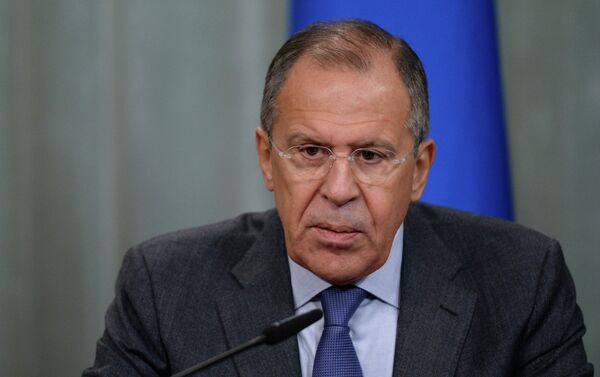MOSCOW, October 29 (RIA Novosti) — The Organization for Security and Co-operation in Europe (OSCE) must work to prevent the emergence of new forms of racism and neo-Nazism in Europe, Russian Foreign Minister Sergei Lavrov said Wednesday.
"While we are getting closer to the 40th anniversary of the adoption of the Helsinki Accords and the 70th anniversary of the end of the Second World War, OSCE, and in particular the ODIHR [Office for Democratic Institutions and Human Rights], should reaffirm the principles upon which the world order is based," Lavrov said during a meeting with ODIHR's director Michael Link.
"One cannot reduce attention to the implementation of the principles of OSCE itself and the UN Charter. It is necessary to redouble efforts to prevent the emergence of new forms of racial discrimination, xenophobia, neo-Nazism," the minister added, noting that Russia will support these efforts.
Lavrov previously stated that Europe has been closing its eyes to the rebirth of fascist ideologies for years.
Lavrov's statement comes amid turbulent times. On Tuesday, German media reported that an entire class in a high school near Leipzig is under investigation praising Hitler and regularly making anti-Jewish remarks over a messaging app.
In Birmingham, United Kingdom, hundreds of supporters of the English Defense League, a far-right, anti-Muslim protest movement, gathered for a major demonstration earlier in October. An informal poll carried out by Birmingham Mail showed that nearly half of respondents were in favor of the demonstration.
Far-right parties have made an advance in European politics in recent months. France's nationalist Front National party gained nearly 25 percent of votes in the 2014 European elections, up from 6.3 percent in 2009.
The German National Democratic Party, described by various media outlets as neo-Nazi, managed to enter the European Parliament as well. The Hungarian radical nationalist Jobbik party, which has described Jews as a "national security risk", secured three of Hungary's 21 seats in the European Parliament and gathered over 20 percent of votes in the 2014 Hungarian parliament elections.


